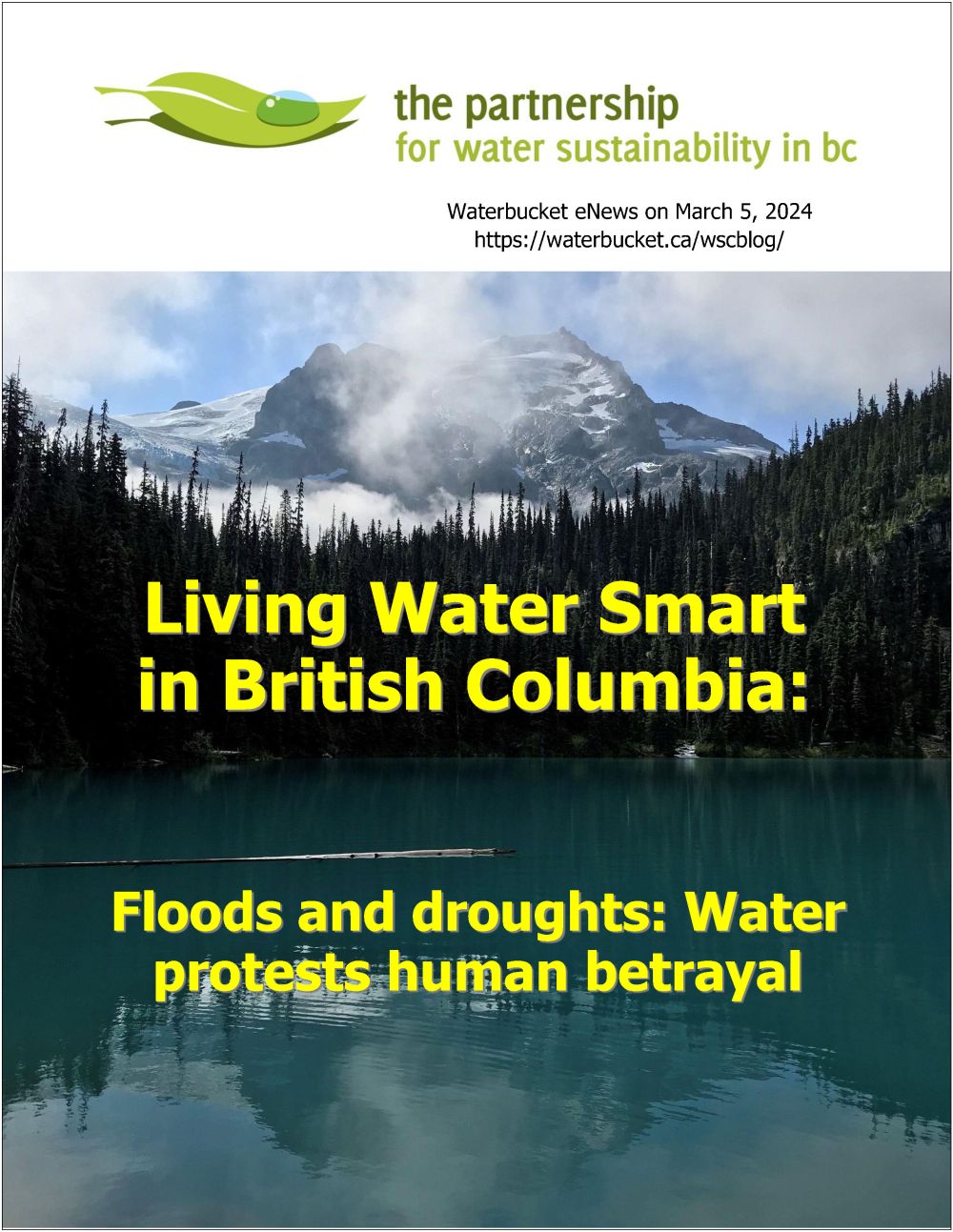HOW BLUE ECOLOGY AND HARRY POTTER ARE CONNECTED: “We invited Michael Blackstock to contribute a chapter on Blue Ecology because we think Michael is well-positioned to help us achieve an ambitious goal,” stated Dr. Serpil Oppermann, co-editor of The Bloomsbury Handbook to the Blue Humanities
Note to Reader:
Published by the Partnership for Water Sustainability in British Columbia, Waterbucket eNews celebrates the leadership of individuals and organizations who are guided by the Living Water Smart vision. The edition published published on March 5, 2024 featured Dr. Serpil Oppermann of Cappodocia University in Istanbul, Turkey. She is one of four co-editors of The Bloomsbury Handbook to the Blue Humanities which will be published in 2025. Her work explores the intersecting perspectives of natural sciences and environmental humanities.
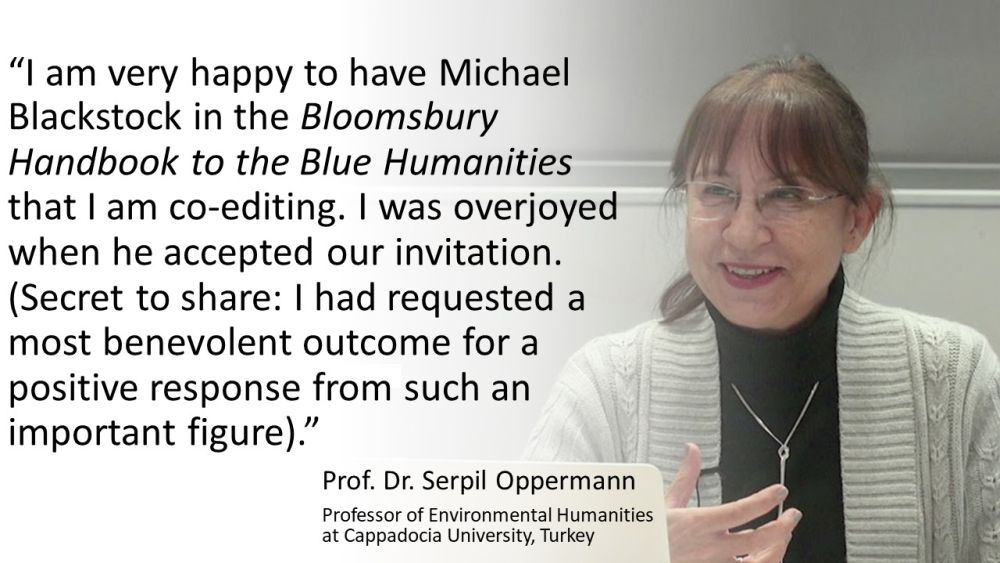
Water protests human betrayal
How are Harry Potter and Blue Ecology connected?
The answer is Bloomsbury Publishing, the originating publisher and custodian of the Harry Potter series. Founded in 1986, much of its growth is attributable to the leap of faith it took with the Harry Potter series after the story had been rejected by all other publishers.
A current leap of faith is The Bloomsbury Handbook to the Blue Humanities which will be published in 2025. Bloomsbury Handbooks is a series of single-volume reference works which map the parameters of a discipline or sub-discipline and present the ‘state-of-the-art’ in terms of research.
It matters what stories we tell and HOW we tell those stories
“We invited Michael Blackstock to contribute a chapter on Blue Ecology because we think Michael is well-positioned to help us achieve an ambitious goal,” explains Dr. Serpil Opperman, one of four co-editors and a catalyst in the discussions behind the scenes. Her mission is to be a bridge between the humanities and science studies.
“We intend this handbook to represent the state of the art in Blue Humanities thinking across different disciplines, regions, theories, and methods. Our Handbook is divided into four sections with a total of thirty-five chapters.”
“Our hope is that these chapters will inform their readers, stimulate their critical imaginations, and leave them wanting to learn more about the discourse of the Blue Humanities.”
“We offer solutions. My solution is to recognize the distressing stories that aquatic agencies are telling us which change the way we tell our stories. It matters what stories we tell and HOW we tell those stories.”
|

EDITOR’S PERSPECTIVE / CONTEXT FOR BUSY READER
“It is a compelling story the way Serpil Opperman has combined her passion for literature studies with quantum physics. That is an irresistible hook for any audience, especially our Waterbucket eNews readers,” stated Kim Stephens, Waterbucket eNews Editor and Partnership Executive Director.
“Her passion and vision for use of storytelling as a means to an end shine through in conversation. Serpil is an integrator. She sees the system as a whole. She is able to bridge the humanities and science. People who can do that with credibility and confidence are few in number.”

How Serpil Opperman chanced upon Blue Ecology in the scholarly literature
“I was curious as to how Serpil had heard about Michael Blackstock and Blue Ecology. As an academic I knew about his 2009 paper, Serpil replied. You have to be informed. You do not rely on a Google search, she added.”
“In his peer-reviewed paper for the International Association of Hydrological Sciences (IAHS), Michael Blackstock laid out the case for an attitude change and culture-shift related to water. The IAHS invited Michael to share his Blue Ecology message at their symposium on the island of Capri because of his work on a UNESCO Expert Panel.”
“Serpil Oppermann and Michael Blackstock are champions for approaches that benefit from interweaving Western science with other ways of knowing. Their whole-system perspectives transcend a purely interdisciplinary approach.”
Story behind the the story:
“At the Capri symposium, the individuals most receptive to Blue Ecology were the hydrology elders. Those with experience understand the limitations and assumptions inherent in how scientific knowledge is applied. They are not dazzled by a slick software interface.”
‘The quotable quote (below) by eminent US hydrologist Robert L. Smith aligns with principles that Michael and Serpil are teaching,” concluded Kim Stephens.
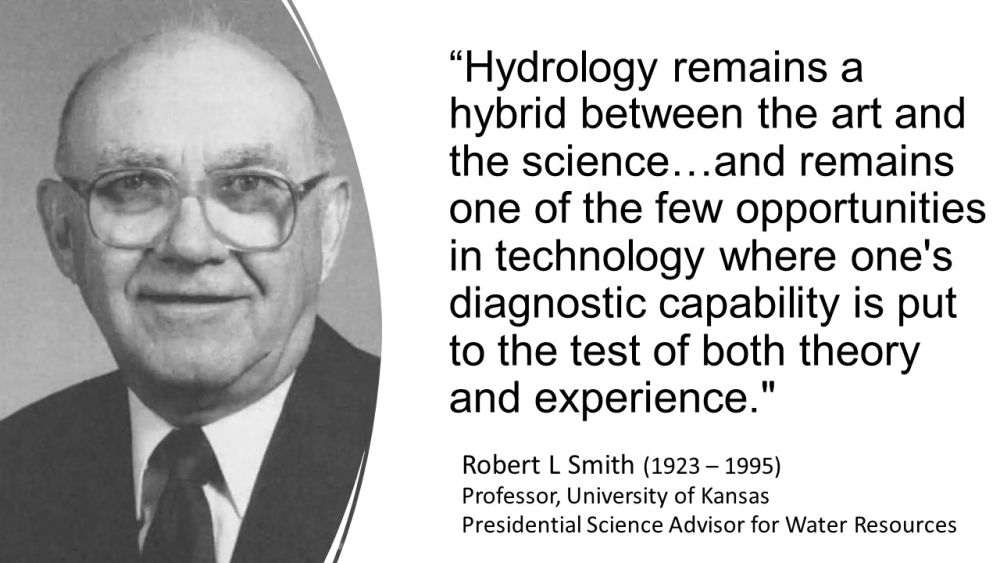
STORY BEHIND THE STORY:
Floods and droughts: Water protests human betrayal
– extracts from a conversation with Dr. Serpil Oppermann
“I have watched the Partnership for Water Sustainability’s video, Watershed Moments Blue Ecology, both the short and long versions,” said Serpil Oppermann at the start of our conversation. “There are many similarities between our approaches and between Indigenous knowledge and traditional Turkish culture – even the sayings are almost the same!! “
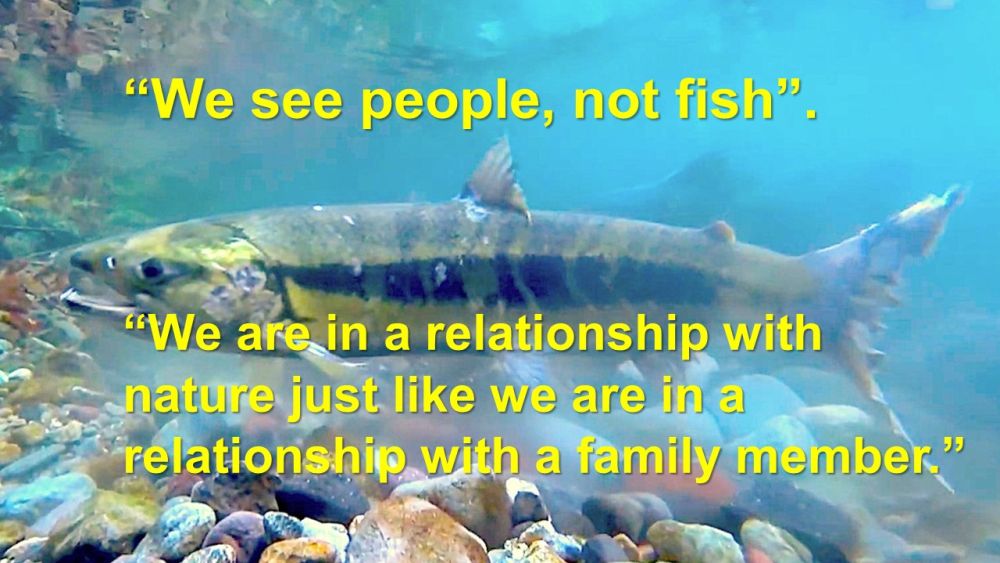
When I replied that people learn through stories, Serpil said, “I agree. As environmental and blue humanities scholars, we like to theorize things and we also like stories. We are storytellers. Though it may sound like a bold claim, I want to affirm that solutions lie in the new stories we tell, and in stories told by aquatic narrative agencies that enable us to think with water.”
Blue Humanities scholars challenge the Green Ecology view of the world
“I am an eco-critic and environmental humanities scholar. We work at the intersections of the sciences and the humanities. Environmental humanities is a field that focuses on the Anthropocene urgencies. But most of the time scholars are writing or talking about ecological devastation that is ongoing on the land.”
“Most of the time, the focus is on Green Ecology. This new field, Blue Humanities, emerged in the early 2000s. People like me and Steve Mentz and others, many of whom are in the United States, challenged this green focus.”
“The term is attributed to Steve Mentz of St. John’s University in New York but in fact he suggested ‘blue cultural studies’ in his 2009 article Toward a Blue Cultural Studies. It was ocean historian John R. Gillis who used the term ‘blue humanities’ for the first time in his 2013 article The Blue Humanities, published in the journal Humanities.”
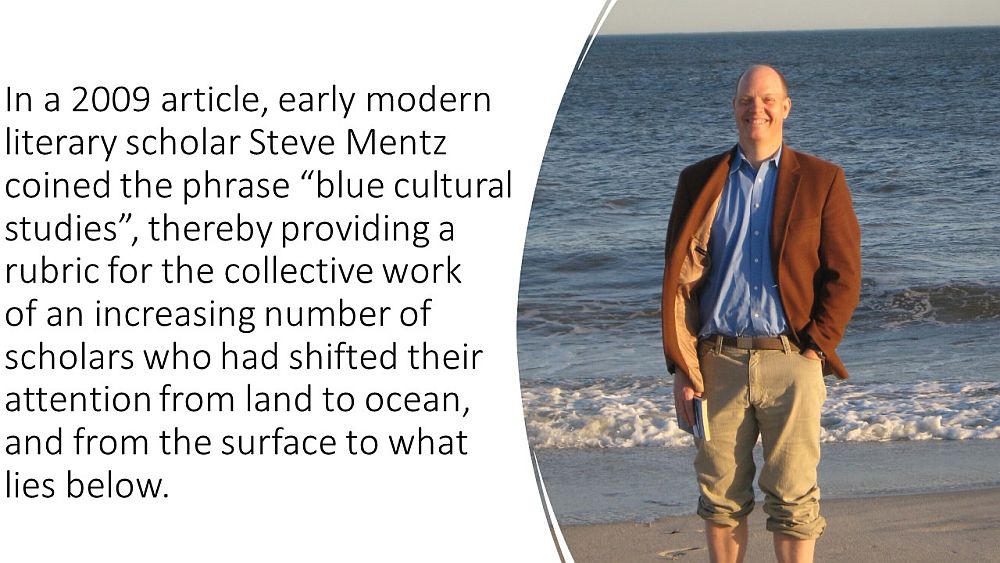
“The colours of this planet are not only green. We live in a multi-hued environment and this planet is mostly water. Why are we neglecting the waterscapes, both oceans and fresh waters?”
“Many of these scholars in the field are from English backgrounds. They are literary scholars. Over the years anthropologists, environmental historians, sociologists and others from the social sciences have joined in.”
Blue Ecology and “The Bloomsbury Handbook to the Blue Humanities”
“This book has 35 chapters. My section titled Discourses has 10 chapters, and Blue Ecology is one of them. I knew that there is this Canadian scholar who developed Blue Ecology and he is very effective in Canada. So, I said to my team, if anyone is going to write the chapter on blue ecology it is going to be Michael Blackstock. He coined the term. It belongs to him.”

Interconnectedness: We affect, and we are affected by water
“As far as my research into water is concerned, I finally realized that in human-water entanglements, the human is an elemental episode in an endlessly revisable text without words, which is water. That way of thinking comes from my post-modern background in English literature.”
“My professor Raymond Federman had said that but he referred to the world rather than water as a text. As far as water-human relations are concerned, I thought, what if I just say that we humans are just an elemental episode. In the big picture, after all, we are latecomers in geological history. That is how I came to see humans and water.”
“Water is always changing, it is transformative. And so do our relations with water. We affect and we are affected by the qualities in water. I also believe we should reflect our interconnectedness with aquatic creatures in a material and symbolic way.”
“World cultures speak of water in metaphoric terms. But if you look at Western cultures in the 19th century, the metaphors reflected the oceans and other waterways as exploitable resources. Whether they were aware of it or not, that was the cultural mindset at the time.”

We have lost our connectedness to the natural habitat
“But the idea behind that mastering mindset is that water and aquatic entities are inert, incapable of expressing themselves. They are seen as commodities. They are not seen as lively, agentic beings who can feel. If you look at water from a sub-atomic perspective, however, it is alive.”
“We affect water, and we are affected by water. It is a two-fold process. When waterways are colonized by socio-political systems as commodities, they protest. Water protests. Water protests human betrayal. Hydrological systems react with extreme floods and extreme droughts.”
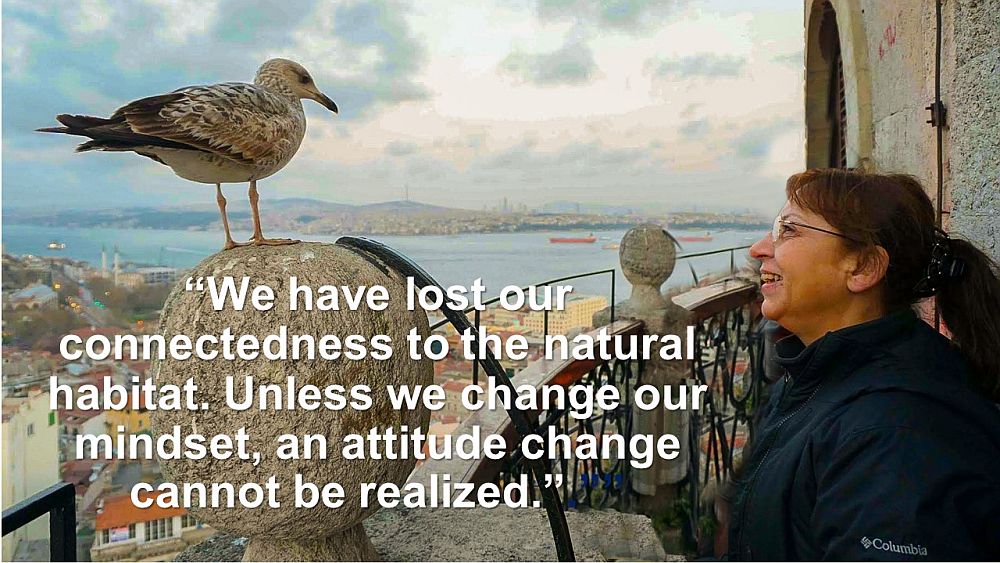
How stories are told and from what perspective these stories are told matters
“The way you think has to change so that you can begin to act differently. We need a mindset change in order to affect an attitude change about water. We also have to rethink the traditional humanist idea that storytelling is all too human and that humans are the only species with the ability to tell stories.”
“WHAT IF the world we cohabit with a myriad of nonhumans is also expressive and is story-filled? HOW MIGHT our understanding of nature change if we recognize nonhuman stories conveyed in codes, signs, colors, body language, gestures, and signals, as stunning narratives?” concludes Serpil Oppermann.
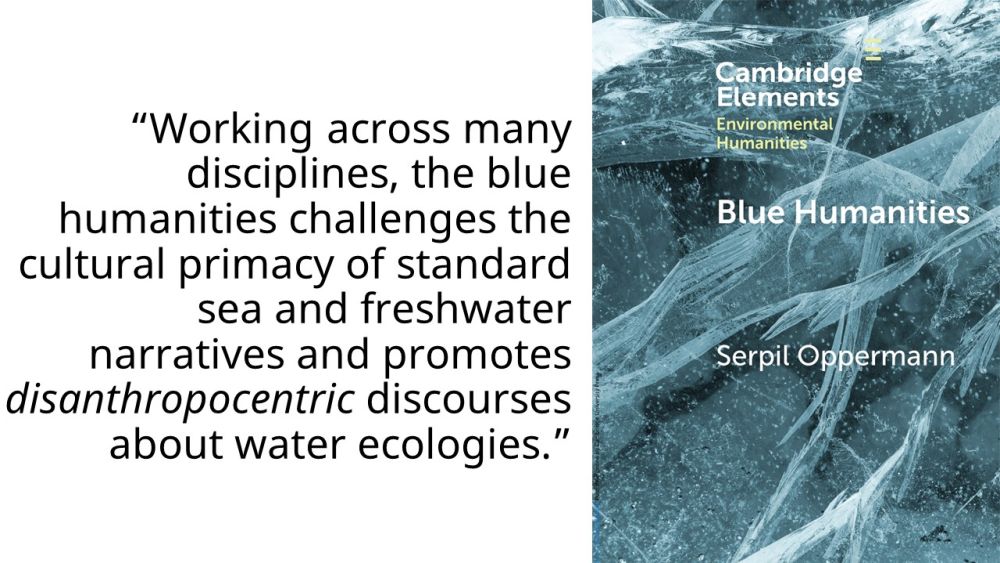
In 2023, Cambridge University Press published Blue Humanities by Serpil Oppermann. Her book lays the groundwork for The Bloomsbury Handbook which will be published in 2025.
Living Water Smart in British Columbia Series
To download a copy of the foregoing resource as a PDF document for your records and/or sharing, click on Living Water Smart in British Columbia: Floods and droughts: Water protests human betrayal.
DOWNLOAD A COPY: https://waterbucket.ca/wcp/wp-content/uploads/sites/6/2024/02/PWSBC_Living-Water-Smart_water-protests-human-betrayal_2024.pdf


